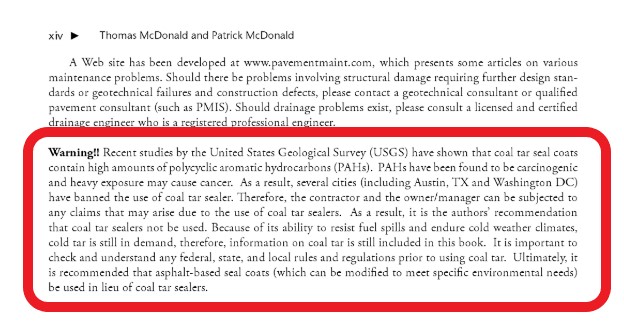Do you want to provide REAL environmental benefits while FULLY considering the business impacts?
This website often focuses on the human health and environmental reasons why a community or a business should end the use of coal tar sealers. But what about the business reasons for ending its use?
I know you’re busy so here are the top 5.
Just so you know, I’m not an environmentalist ranting about something to drive donations or sell a product. I am a former small business owner myself that had to deal with the complexities of regulations and the bottom line. You also might find it interesting that my family used coal tar in the roofing business over 4 generations and nearly 100 years.
In light of that, I ask you to please consider the following.
1. Lowes and Home Depot Stopped Selling Coal Tar Sealers Based Upon a Business Model
In 2007, I worked with the City of Austin team advising the New York Academy of Sciences on PAH pollution in the NY Harbor. At those meetings, the Chief Sustainability Officer for Lowes, Michael Chennard, said that they stopped selling coal tar sealants after learning about it from Austin, based upon a business model. Here’s the Lowes’ equation:
1. Identify products that have a high potential liability. He said their pockets were now deeper than many of their suppliers, so they have more to lose.
2. Find out if there are suitable alternatives in quality and price.
3. If both the quality and prices are similar, then remove the problematic product from the shelves
If it isn’t good enough for Lowes and Home Depot, why is it good enough for your community or business? Who would continue to use a product that has a sound replacement and reduces liability?
2. Regulations are for Bad Actors, Not Good Ones
A few years ago it became apparent that a line of Samsonite luggage had high PAHs in the handles of their suitcases. What did they do? Deny it? Deflect the attention away from it?
No they tested their products and recalled 250,000 units and fixed the problem. No government intervention at all.
That is not what the coal tar industry has done. They have clearly demonstrated a lack of transparency and positive action to curb the exposure of the public and the environment to these toxins.
You can read more about it here: http://www.cbsnews.com/news/samsonite-recalls-tokyo-chic-suitcases-amid-cancer-fears-over-handles/
3. The True Costs of Coal Tar Sealers are Less than the Benefits
The State of Minnesota estimated cost for the 3.3 million people in the Minneapolis-St. Paul area to clean up after coal tar sealer contamination was over $1 billion! The cost of cleaning it up is many times greater than the value of the installed product in the first place!
Here’s another example. The City of Austin was encouraged by the State of Texas to clean up a small drainage swale which had been contaminated by coal tar sealers from a single apartment complex near Barton Springs Pool. The cost, complete with workers in moon suits because of the high PAH concentrations, was about $500,000! This was for a single parking lot drainage.
This does not include the cost of undesirable health outcomes (cancer, decreased fertility, poor birth weight and IQ caused by the chemicals which are in potent quantities in coal tar sealers). A Baylor toxicologist said cancers from coal tar sealers likely affects a large number of Americans and they don’t even know it.
Let’s talk about the cost of cancer. According to the American Institute of Cancer Research, the nationwide cost of cancer is $900 billion dollars. The proportional cost, based solely on population, to a city like San Antonio would be $4.5 billion.
Wouldn’t business leaders want to reduce overall health and community costs?
4. Paving Experts Recommend Against Using Coal Tar Sealers
The liabilities of using coal tar sealers on commercial parking lots are so great that a guidance manual for commercial properties issued this warning in their hardback book, Guide to Pavement Maintenance:

5. Prospects are Good for Sealer Industry in the US Even Without Coal Tar
A market research company recently confirmed what one CEO of a sealer company said a few years ago: bans really won’t hurt the sealcoat business.
In the projected period through 2024, the industry is expected to experience “moderate growth” but “rising bans on coal tar-based sealers, the improved performance of asphalt-based sealers, and competitive pricing are expected to result in the increased consumption of bitumen and asphalt sealers…”
http://www.transparencymarketresearch.com/north-america-sealers-market.html
Those are my top 5 business reasons for stopping the sale and use of coal tar sealers. Would any community or business need any more reasons?

